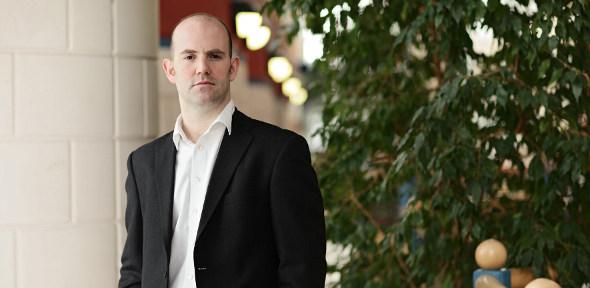
Alumnus Eben Upton is co-founder of The Raspberry Pi Foundation, a charity founded in 2009 to promote the study of basic computer science in schools, and is responsible for developing a single-board computer called the Raspberry Pi.
The Royal Academy of Engineering celebrates the strength and diversity of UK engineering with the presentation of its coveted Silver Medal - winners must have achieved significant commercial success in their fields and be recognised for advancing the cause of engineering in this country.
Royal Academy of Engineering citation
Eben is one of four entrepreneurs who have been awarded a Silver Medal from the Royal Academy of Engineering. He has sold more than a million units of his cheap, credit card-sized computer. The medal marks “significant commercial success” achieved by those who have also “advanced the cause” of British engineering.
Eben developed the Raspberry Pi computer to help children learn about computer programming and inspire a new generation of engineering talent. He was inspired by Acorn’s BBC Micro computer, which helped students and hobbyists learn about computers in the 1980s.
Proceeds from sales of the Cambridge-developed Raspberry Pi computer – which retails for as little as $25 (£16.26) – go to the Raspberry Pi Foundation. The introduction of the computer in February last year was met with such strong demand that the organisation’s website crashed.
The Raspberry Pi has won fans far beyond the classroom, with uses including a controller for a robotic boat which is steering itself across the Atlantic Ocean, and powering cameras designed to help park rangers to prevent illegal poaching in Kenya.
The Raspberry Pi computer is on a tiny circuit board and has one or two USB ports on one end to plug into a keyboard and mouse and a connection for a TV on the other end. The result is a working computer running a Linux operating system at very little cost, and a device that that has been designed to encourage users to tinker around with the components.
Eben started his undergraduate life at Cambridge as a Physicist then moved across to the Department of Engineering in his third year to join the Electrical and Information Sciences Tripos, with his focus very much on computing. Part way through his third year in 1998 he started a computer graphics company, Ideaworks, and as the company quickly became a success Eben deferred his studies for a year. He returned to Cambridge to do a post graduate Diploma of Computer Science. From the Diploma he went straight onto a PhD at Cambridge's Computer Lab, carrying out research into optimizing compilers for the C programming language.
After his PhD Eben worked briefly for a small company in Newmarket that made low voltage motor controllers for golf buggies etc. This is where he really discovered electronics. He went on to join Broadcom Corporation, a global leader in semiconductor solutions for wired and wireless communications. During the last year of his PhD and his first year at Broadcom Eben took on the post of Director of Studies for St John's College. It was whilst interviewing potential undergraduates that he realised there was a huge skills shortage in those applying for Computer Science. He noticed that past applicants who had started programming on their Commodore 64s, Amigas and BBC Micro Computers of years gone by were much better versed in computer science than the Windows generation who were taught basic computer literacy and not pushed to learn to code. Huge drops in the numbers of applicants supported his theory that schools were not doing enough to encourage programming. He recognised that children need a platform to learn to program; by 2010 he had created a chip suitable for this purpose, BCM2835, which is now used in the Raspberry Pi.
Today a Raspberry Pi can be purchased and delivered for under £20 and they can also be purchased bundled with educational software. Raspberry Pi computers can talk to each other and to electronic sensors, lights etc which is not something that a PC can typically do out of the box. As the Raspberry Pi market has grown it has become clear that the bulk of the community are adults, programmers and hobbyists, and approximately 20% to 30% are children which means that Raspberry Pi has potentially reached 200,000/300,000 children.
Computer Science application numbers at Cambridge were up by 30% last year and although Eben does not claim this is the result of Raspberry Pi he does believe that the Raspberry Pi Foundation has helped to create a lot of noise about computer science and has been an excellent awareness raising tool.
Eben is very conscious that the majority of Raspberry Pi computers being used by children are the children of engineers in the prosperous western world. The foundation's remit is to broaden this audience to reach children from all backgrounds and geographical areas. In order to achieve this the Foundation are focusing on producing support materials that will enable children to be able to pick up a Raspberry Pi computer and by self-directed learning teach themselves programming and understand how computers work.
For further information keep an eye on the Raspberry Pi home page www.raspberrypi.org. The forum on the Raspberry Pi website and wiki http://elinux.org/RaspberryPiBoard are also both excellent resources for more information.

